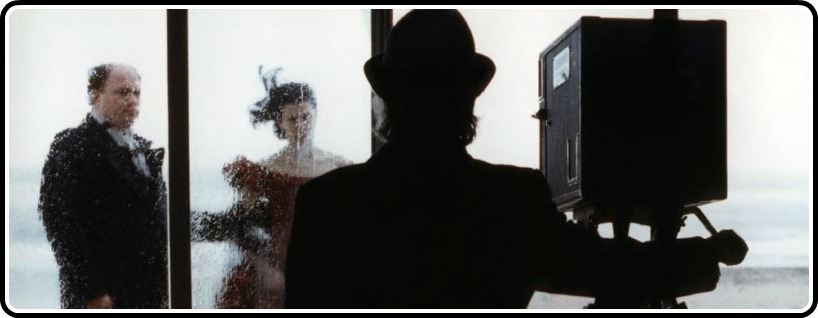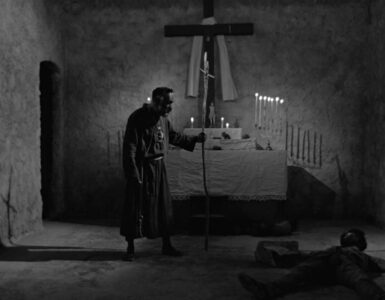A lot can be said about a filmmaker like Jean-Luc Godard. Starting off his career as a playful French New Wave leader, he has since become a cinematic revolutionary, philosopher and all around malcontent with as much love for disjointed narratives and political discussions as he is poetry and philosophy. With each passing picture seemingly becoming more and more impenetrable, his most recent work (actually much of his work following the release of Weekend) has become controversial and often times bitterly polarizing, even for his most die hard of fans. However, that hasn’t left the director any less interested in bringing his ideas to the big screen, and thankfully a handful of his later-career works have finally become available to watch on DVD and Blu-ray here stateside.
One such film is his 1996 motion picture, For Ever Mozart. One of his most impossibly dense and intellectually rich late-career works, the film is nearly impossible to try and describe with any straight forward log line. A series of four short pieces, the film jumps from one story to the next, all attempting to wax poetic about the inability for one to bring order to chaos. One of Godard’s toughest watches, the film’s story is loose and freewheeling, introducing us to a handful of characters that are nothing more, really, than vehicles for Godard’s cinematic and philosophical rebellion. Ranging from a theater troupe hell bent on performing a play in war torn Sarajevo to a director unable to get his newest picture truly off the ground, the film’s plot is thin while the themes are heavy and obtuse (thankfully the film is only short of 90 minutes, so pacing isn’t much of an issue), and while it may come off (in many ways rightly so) as a pretentious bit of musing by a director past his prime, this is as gorgeous and vital a picture as Godard would make during this period.
Aesthetically, this and a film like the fellow Cohen Film Collection release Hail Mary are true examples of Godard’s evolution (or arguably de-evolution) as a filmmaker. Where as his early work oozed a sense of punk rock energy (look no further than a film like A Woman Is A Woman), these pictures are brooding, icy cold pieces of art, almost Kubrickian in the use of the frame as a tangible, static entity. A static camera is the name of the game here, simply finding Godard pointing and shooting at some of the most beautifully framed images you’ll ever see. Particularly here, be it shots of the ocean or a woman’s foot, this film is lusciously framed and truly one of the most exciting bits of direction from this era of Godard’s canon.
Thematically, the film is absolutely impenetrable. Here’s where we’ll begin discussing the newly released Blu-ray from Cohen, because without one of its supplements, the fil is nearly impossible to understand. There is a commentary here with film critic James Quandt, and while it’s not the most engaging listen, it reads as if you’re watching a Pop Up Video version of this picture, finally getting to be on the same intellectual level as the one Godard is coming at. With references to classical painting, music, philosophy and poetry, this film is aesthetically engrossing, but if you’re intrigued by it enough on the first, almost purely base level, a second viewing with this commentary is an absolute must. Themes become far richer and more cognizant, and even as a Godard acolyte I found the first and second viewing of this film to be rather bewildering on a referential and thematic level. Inherently a picture about finding order in chaos, there is so much more going on below the surface here ranging from Godard’s angst towards the European Union to a theme he’d look at a few times in his career, the absurdity of war. Also with tinges of Bergman thrown in for good measure, this is truly unlike any film Godard had made before, or has truly made since. Even a film like Film Socialisme, his latest, opens up as the film goes along. This is truly a pure blooded cinematic experiment by one of the medium’s greatest bad boys.
The transfer here is superb. Visually it’s an absolutely striking masterpiece, and with the aforementioned commentary, the release has what may be the best and most important supplement so far this year. Like being handed a key to a lost language, the commentary is a must listen for those interested in the picture. There are a handful of interviews available for the first time in the states, including interviews with names like Francois Musy and Antoine de Baecque, and even a re-release trailer. All in all, while the film itself may be one of the most obtuse Godard has yet made, it’s also one of his most entrancing and visually wondrous pictures yet.







![Bergman Island (The Criterion Collection) [Blu-ray]](https://criterioncast.com/wp-content/uploads/2022/11/bergman-island-the-criterion-collection-blu-ray-400x496.jpg)
![This Is Not a Burial, It’s a Resurrection (The Criterion Collection) [Blu-ray]](https://criterioncast.com/wp-content/uploads/2022/11/this-is-not-a-burial-its-a-resurrection-the-criterion-collection-blu-ray-400x496.jpg)
![Lars von Trier's Europe Trilogy (The Criterion Collection) [The Element of Crime/Epidemic/Europa] [Blu-ray]](https://criterioncast.com/wp-content/uploads/2022/11/lars-von-triers-europe-trilogy-the-criterion-collection-the-element-of-400x496.jpg)
![Imitation of Life (The Criterion Collection) [Blu-ray]](https://criterioncast.com/wp-content/uploads/2022/11/imitation-of-life-the-criterion-collection-blu-ray-400x496.jpg)
![The Adventures of Baron Munchausen (The Criterion Collection) [4K UHD]](https://criterioncast.com/wp-content/uploads/2022/11/the-adventures-of-baron-munchausen-the-criterion-collection-4k-uhd-400x496.jpg)
![Cooley High [Criterion Collection] [Blu-ray] [1975]](https://criterioncast.com/wp-content/uploads/2022/11/cooley-high-criterion-collection-blu-ray-1975-400x496.jpg)